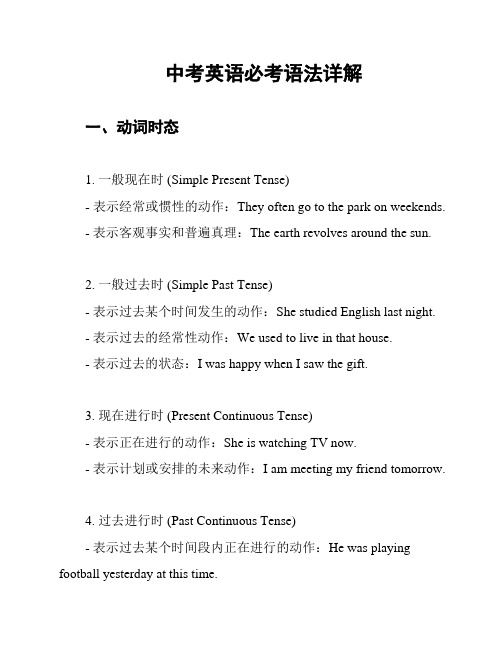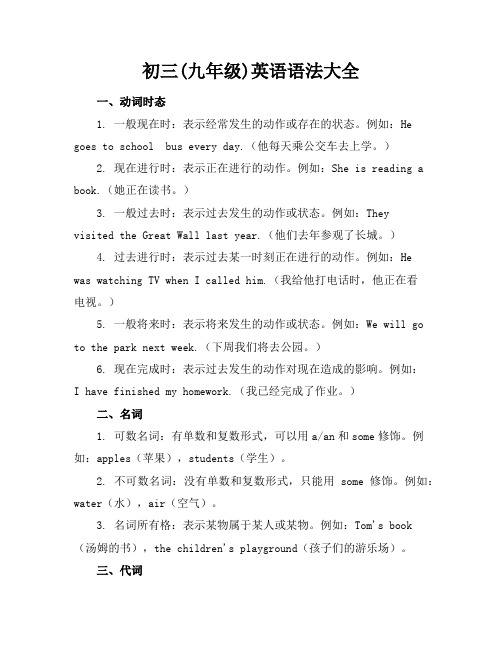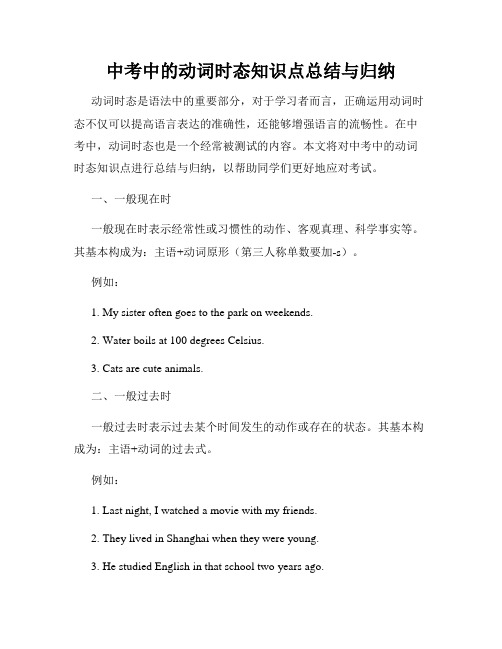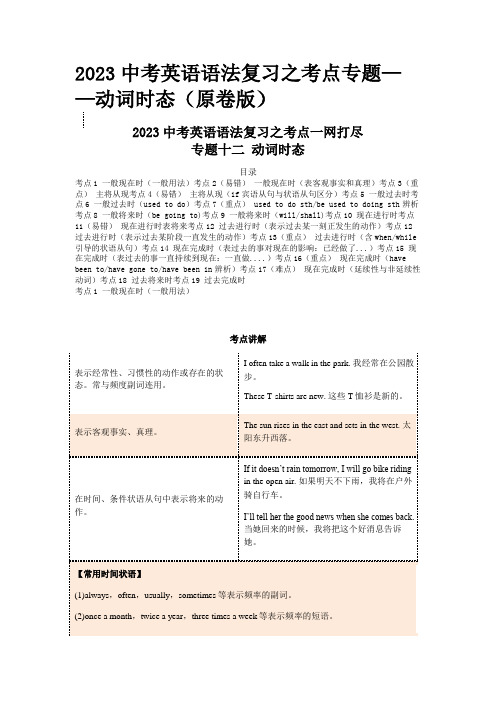《中考英语》初中英语语法知识—动词时态的知识点总复习
中考英语必考语法详解

中考英语必考语法详解一、动词时态1. 一般现在时 (Simple Present Tense)- 表示经常或惯性的动作:They often go to the park on weekends.- 表示客观事实和普遍真理:The earth revolves around the sun.2. 一般过去时 (Simple Past Tense)- 表示过去某个时间发生的动作:She studied English last night.- 表示过去的经常性动作:We used to live in that house.- 表示过去的状态:I was happy when I saw the gift.3. 现在进行时 (Present Continuous Tense)- 表示正在进行的动作:She is watching TV now.- 表示计划或安排的未来动作:I am meeting my friend tomorrow.4. 过去进行时 (Past Continuous Tense)- 表示过去某个时间段内正在进行的动作:He was playing football yesterday at this time.5. 现在完成时 (Present Perfect Tense)- 表示过去发生的与现在有联系的动作或状态:He has already finished his homework.6. 过去完成时 (Past Perfect Tense)- 表示过去某个时间点之前已经发生的动作或状态:She had already left when I arrived.7. 将来时 (Future Tense)- 表示将来要发生的动作或存在的状态:I will go to Beijing next week.二、被动语态1. 被动语态的构成:be + 过去分词- 主动语态:Tom eats an apple.- 被动语态:An apple is eaten by Tom.2. 被动语态的使用:- 强调动作的承受者:The book is written by a famous author.- 不知道或没有必要知道动作的执行者:The door was broken yesterday.三、情态动词1. can / could- 表示能力或许可:I can swim very well.- 表示请求或建议:Could you open the window, please?2. may / might- 表示允许或可能:You may go home now.3. must- 表示必须或肯定:She must finish her assignment by tomorrow.4. shall / should- 表示将要或应该:We should keep the classroom clean.四、倒装句1. 把助动词或情态动词提前,主语放在动词之后:- Never have I seen such a beautiful sunset.- Only after he left did I realize my mistake.2. 用于表示地点、方向、时间等状语提前:- At the top of the mountain stands a little cottage.- In front of the house is a beautiful garden.五、定语从句1. 定语从句用来修饰一个名词或代词,用以给出更多的信息。
初三(九年级)英语语法大全

初三(九年级)英语语法大全一、动词时态1. 一般现在时:表示经常发生的动作或存在的状态。
例如:He goes to school bus every day.(他每天乘公交车去上学。
)2. 现在进行时:表示正在进行的动作。
例如:She is reading a book.(她正在读书。
)3. 一般过去时:表示过去发生的动作或状态。
例如:Theyvisited the Great Wall last year.(他们去年参观了长城。
)4. 过去进行时:表示过去某一时刻正在进行的动作。
例如:He was watching TV when I called him.(我给他打电话时,他正在看电视。
)5. 一般将来时:表示将来发生的动作或状态。
例如:We will go to the park next week.(下周我们将去公园。
)6. 现在完成时:表示过去发生的动作对现在造成的影响。
例如:I have finished my homework.(我已经完成了作业。
)二、名词1. 可数名词:有单数和复数形式,可以用a/an和some修饰。
例如:apples(苹果),students(学生)。
2. 不可数名词:没有单数和复数形式,只能用some修饰。
例如:water(水),air(空气)。
3. 名词所有格:表示某物属于某人或某物。
例如:Tom's book(汤姆的书),the children's playground(孩子们的游乐场)。
三、代词1. 人称代词:I(我),you(你/你们),he(他),she(她),it(它),we(我们),they(他们)。
2. 物主代词:my(我的),your(你的/你们的),his(他的),her(她的),its(它的),our(我们的),their(他们的)。
3. 指示代词:this(这个),that(那个),these(这些),those(那些)。
初中英语知识归纳总结——动词的时态

初中英语知识归纳总结——动词的时态动词的时态(一)教学重点一般现在时在英语中,不同时间里以不同方式发生的动作或存在的状态,要用不同的动词形式来表示,动词的这种不同形式称为动词的时态。
时态从时间上划分,可分为四大类:现在时;过去时;将来时;过去将来时。
从行为上,每一类可以分为四种形式:一般式;进行式;完成式;完成进行式。
这样英语的动词合起来,总共有十六种时态,初中只需掌握其中的八种时态。
1、一般现在时(1)一般现在时表示现在的状态、习惯性的动作或主语所具备的性格和能力等。
①当动词是be时,第一人称用am,第二人称用is,其他人称用are.②当动词是实义动词时,一般用动词原形,但如果主语是第三人称单数时,动词必须用第三人称单数形式,其变化规则如下:助动词do(第三人称单数用does)构成否定句、疑问句及答语,但要注意助动词后原来的谓语动词要恢复原形。
例如:I like music.I don’t like music.Do you like music?Yes, I do No, I don’t(2)一般现在时的用法①表示经常、习惯性动作,常和often, usually, every day, sometimes, always 等时间状语连用。
如:He goes to school by bus every day.They often play football②表示能力、职业、特征。
如:Miss Gao teaches English.Do you speak Japanese?③表示客观存在。
如:The earth moves round the sun.Time and tide wait for no man.④表示已经安排好或计划好的事。
如The plane takes off at 7:30.Classes begin at 8:00⑤在时间状语和条件状语从句中,主句用一般将来时,从句用一般现在时。
初中英语知识点归纳动词的不同时态与语态

初中英语知识点归纳动词的不同时态与语态动词的不同时态与语态是初中英语的重要知识点。
掌握了动词的时态和语态,我们就能更准确地表达过去、现在和将来的动作,以及主语对动作的不同态度。
下面是对初中英语中动词的不同时态与语态的归纳总结。
一、动词的时态1. 一般现在时一般现在时表示经常性或习惯性的动作、客观真理、固定事件等。
例句:- I go to school every day.(我每天去上学。
)- The sun rises in the east.(太阳从东方升起。
)2. 现在进行时现在进行时表示现在正在进行的动作。
例句:- He is watching TV now.(他正在看电视。
)- They are playing basketball in the park.(他们正在公园里打篮球。
)3. 一般过去时一般过去时表示过去发生的动作或存在的状态。
例句:- We watched a movie last night.(昨晚我们看了一场电影。
)- She lived in Beijing when she was young.(她年轻时住在北京。
)4. 过去进行时过去进行时表示过去某个时间正在进行的动作。
例句:- They were having dinner at 7 o'clock yesterday.(昨天7点他们正在吃晚饭。
)- At this time last year, I was studying in London.(去年这个时间,我正在伦敦学习。
)5. 将来时将来时表示将要发生的动作或存在的状态。
例句:- We will go to the beach next week.(下周我们将去海滩。
)- She is going to visit her grandparents tomorrow.(她明天将要去看望她的祖父母。
)二、动词的语态1. 主动语态主动语态表示主语是动作的执行者。
中考中的动词时态知识点总结与归纳

中考中的动词时态知识点总结与归纳动词时态是语法中的重要部分,对于学习者而言,正确运用动词时态不仅可以提高语言表达的准确性,还能够增强语言的流畅性。
在中考中,动词时态也是一个经常被测试的内容。
本文将对中考中的动词时态知识点进行总结与归纳,以帮助同学们更好地应对考试。
一、一般现在时一般现在时表示经常性或习惯性的动作、客观真理、科学事实等。
其基本构成为:主语+动词原形(第三人称单数要加-s)。
例如:1. My sister often goes to the park on weekends.2. Water boils at 100 degrees Celsius.3. Cats are cute animals.二、一般过去时一般过去时表示过去某个时间发生的动作或存在的状态。
其基本构成为:主语+动词的过去式。
例如:1. Last night, I watched a movie with my friends.2. They lived in Shanghai when they were young.3. He studied English in that school two years ago.三、一般将来时一般将来时表示将来某个时间要发生的动作或存在的状态。
其基本构成为:主语+will/shall+动词原形。
例如:1. I will go to Beijing next week.2. She will study hard for the exam.3. They shall visit their grandparents during the summer vacation.四、现在进行时现在进行时表示现在正在进行的动作。
其基本构成为:主语+am/is/are+动词-ing。
例如:1. We are having dinner.2. He is playing basketball in the park.3. They are studying for the test.五、过去进行时过去进行时表示过去某个时间正在进行的动作。
2023中考英语语法复习之考点专题——动词时态(原卷版)

2023中考英语语法复习之考点专题——动词时态(原卷版)2023中考英语语法复习之考点一网打尽专题十二动词时态目录考点1 一般现在时(一般用法)考点2(易错)一般现在时(表客观事实和真理)考点3(重点)主将从现考点4(易错)主将从现(if宾语从句与状语从句区分)考点5 一般过去时考点6 一般过去时(used to do)考点7(重点) used to do sth/be used to doing sth辨析考点8 一般将来时(be going to)考点9 一般将来时(will/shall)考点10 现在进行时考点11(易错)现在进行时表将来考点12 过去进行时(表示过去某一刻正发生的动作)考点12 过去进行时(表示过去某阶段一直发生的动作)考点13(重点)过去进行时(含when/while 引导的状语从句)考点14 现在完成时(表过去的事对现在的影响:已经做了...)考点15 现在完成时(表过去的事一直持续到现在:一直做....)考点16(重点)现在完成时(have been to/have gone to/have been in辨析)考点17(难点)现在完成时(延续性与非延续性动词)考点18 过去将来时考点19 过去完成时考点1 一般现在时(一般用法)考点讲解1.(2021·上海松江·二模)Tim likes watching films. He _________ to the cinema with his girlfriend once a week.A.goes B.is going C.has gone D.will go2.(2020·湖北恩施)I hear that it often ________ in Sichuan and there are usually floods, especially in summer.A.rains B.rained C.will rain3.(2021·北京房山·二模)Mary ________ her grandparents every weekend.A.visits B.was visiting C.is visiting D.has visited4.(2021·广西桂林)The zebra eats grass, but it ________ eat meat.A.doesn’t B.didn’t C.don’t5.(2021·黑龙江·齐齐哈尔市碾子山区教师进修学校一模)—Do you like the flower? —Yes. It ________ sweet.A.is smelling B.smells C.smelt考点2(易错)一般现在时(表客观事实和真理)考点讲解精选练习6.(2020·天津红桥·二模)In the past, people didn't know the earth ________round the sun. A.going B.goes C.will go D.go7.(2021·吉林长春·模拟预测)The teacher told us that the sun ________ in the east. A.rises B.rise C.rose D.rising考点3(重点)主将从现考点讲解精选练习8.(2021·四川乐山)—What’s your plan for the summer holiday?—I’ll go to Chendu as soon as the school term ___________.A.end B.ends C.will end9.(2021·广西河池)Mrs. Green will take her son to the amusement park if she ________ the tickets.A.got B.gets C.is getting D.will get10.(2021·辽宁丹东)We can’t avoid traffic accidents unless everyone ________ the rules. A.follows B.breaks C.will follow D.will break考点4(易错)主将从现(if宾语从句与状语从句区分)考点讲解精选练习11.(2021·辽宁鞍山)—Tina wants to know if you ________ to the park with us tomorrow. —I’d love to. But if it ________, I may go to the library instead.A.go; will rain B.go; rains C.will go; rains D.will go; will rain12.(2020·黑龙江牡丹江)—I wonder if we ________a farewell party next week. —If we________it, I will call you.A.will have ; have B.have;will have C.will have; will have13.(2021·黑龙江哈尔滨)—I wonder if you ________ us for the English party tomorrow. —If I ________ free, I will go with you.A.will join, am B.will join, will be C.join, am考点5 一般过去时考点讲解精选练习14.(2021·广西贵港)—Where does Bill live? —He ________ me his address, but I can’t remember it now.A.tells B.told C.is telling D.will tell15.(2021·四川达州)— Alice has gone out. — Oh, has she? What time ________ she________?A.has; gone B.will; go C.did; go D.is; going16.(2021·江苏徐州)In my school days, I ________ a lot of reading in English every day. That was how I learned English at that time.A.do B.did C.have done D.will do17.(2021·重庆)Last Sunday my brother and I ________ our grandparents.A.will visit B.visits C.visit D.visited18.(2021·内蒙古兴安盟)— Have you ever been to Shanghai? — Of course. Actually, I________ there for six years, but now I live in Beijing.A.worked B.was working C.would work D.have worked考点6 一般过去时(used to do)考点讲解精选练习19.Mr Jiang isn’t as busy as before because there ___________no home robot to help him.A.used to be B.may be C.used to have D.may have20.I ________ in this small mountain village when I was a child.A.use to live B.used to living C.used to live D.used to life21.(2019·江苏镇江)Yao Ming, a basketball giant , ___________ water polo when he was young.A.is playing B.used to play C.is used to playing D.was playing考点7(重点) used to do sth/be used to doing sth辨析考点讲解精选练习22.(2020·湖南益阳)Diana used to _________ to work, but now she is used to ________ because the road is crowded and she wants to keep fit.A.drive; walk B.drive; walking C.driving; walk23.Dick __________ in America, but he has been ___________ Chinese food since he moved to China.A.used to live; used to eating B.is used to live; used to eat C.is used to live; used to eating D.used to living; used to eat24.—How does your brother go to school? —He ___________ ride a bike, but now he__________ there to keep fit.A.used to; is used to walk B.used to; is used for walking C.was used to; is used to walking D.used to; is used to walking考点8 一般将来时(be going to)考点讲解一般将来时表示将来某个时间要发生的动作,事情或存在的状态,也表示将来经常或反复发生的动作或事情。
初中动词时态知识点总结
初中动词时态知识点总结动词时态是英语语法中的一个重要方面,它描述了动作或事件在不同的时间发生,表达动作的状态和行为发生的时间关系。
掌握动词时态对于学习和使用英语非常重要。
本文将总结初中动词时态的知识点,帮助大家更好地理解和运用。
一、一般现在时(Simple Present Tense)一般现在时描述经常性的动作、习惯、定律、客观事实等。
1. 表示经常性的动作或习惯- 主语 + 动词原形- I play football every weekend.- She reads books before going to bed.- We often visit our grandparents during the summer vacation.2. 表示客观事实、普遍真理等- 主语 + 动词原形- The sun rises in the east.- Water boils at 100 degrees Celsius.- Cats like to chase mice.二、一般过去时(Simple Past Tense)一般过去时描述过去已经发生并完成的动作、习惯、经历等。
1. 表示过去发生的动作或经历- 主语 + 动词过去式- I watched a movie last night.- She visited her friend yesterday.- We lived in London for five years.2. 表示过去的习惯- 主语 + used to + 动词原形- I used to go swimming every summer.- He used to play basketball when he was young.三、一般将来时(Simple Future Tense)一般将来时描述将来会发生的动作、计划、打算等。
1. 表示将来会发生的动作或计划- 主语 + will + 动词原形- I will visit my grandparents next week.- She will study abroad after finishing high school.- They will have a party for their anniversary.2. 表示意愿、决定和承诺- 主语 + be going to + 动词原形- I am going to start a new job next month.- He is going to learn how to play the guitar.- We are going to travel around the world in the future.四、现在进行时(Present Continuous Tense)现在进行时描述正在进行的动作、当前的情况和变化等。
中考语法知识点归纳动词时态语态与非谓语动词
中考语法知识点归纳动词时态语态与非谓语动词动词时态、语态与非谓语动词是中考英语中的重要考点,掌握好这些知识,将有助于提升语法水平和英语写作能力。
本文将对中考语法知识点进行归纳总结,帮助同学们更好地理解和应用。
一、动词时态动词时态是指动词表示的动作或状态发生的时间或状态。
常见的动词时态有以下几种:1. 一般现在时:表示经常性、习惯性的动作或客观真理。
例句:He plays basketball every day.2. 一般过去时:表示过去某个时间发生的动作或状态。
例句:I watched a movie last night.3. 一般将来时:表示将来要发生的动作或状态。
例句:I will go to Beijing next week.4. 现在进行时:表示现在正在进行的动作。
例句:She is reading a book now.5. 过去进行时:表示过去某个时间正在进行的动作。
例句:I was studying when he called me.6. 现在完成时:表示过去的动作对现在造成的影响或结果。
例句:She has visited Paris three times.7. 过去完成时:表示对过去某个时间之前发生的动作进行的描述。
例句:They had already left when I arrived.二、动词语态动词语态是指动作发出的主体和动作所受的影响关系。
英语中常见的动词语态有以下几种:1. 主动语态:表示主语是动作的发出者。
例句:He fixed the car yesterday.2. 被动语态:表示主语是动作的承受者。
例句:The car was fixed by him yesterday.3. 进行时态:表示主语正在进行的动作处于进行状态。
例句:The book is being read by her.4. 完成时态:表示主语已经完成的动作处于完成状态。
例句:The book has been read by her.注意:被动语态需要根据动作的时态来变换,同时需要适当更改时态动词。
中考英语二轮复习知识点清单(11)动词时态语态
(11)动词时态语态——中考英语知识清单一、动词时态语态的定义1. 动词时态指的是谓语动词用来表示动作或情况发生时的各种动词形式。
英语中一共有16种时态,但在初中阶段常考的时态有以下9种:一般现在时、一般过去时、一般将来时、现在进行时、过去进行时、现在完成时、过去完成时、现在完成进行时、过去将来时。
考查重点集中在一般现在时在条件状语从句和时间状语从句中的用法、终止性动词在现在完成时中不能与for,since短语或从句连用,have been to与have gone to的用法以及在具体语境中动词的用法等。
2. 动词的语态是表示句子主语与谓语动词之间关系的一种动词形式。
英语中的动词语态有两种:主动语态和被动语态。
主动语态表示的主语是动作的执行者或发出者,被动语态表示的主语是动作的承受者。
被动语态是中考中的必考内容之一,其中考查的重点是一般现在时、一般过去时和含有情态动词的被动语态。
二、动词的时态1. 一般现在时(1)表示现阶段经常性、习惯性的动作或存在的状态、特征。
常用的时间状语有often,usually,always,sometimes,every day/week等。
注意:当第三人称单数作主语时,别忘了动词的变化。
例:He usually goes to school by bike.他通常骑自行车上学。
(经常性动作)They're both fine, too.他们两个也都很好。
(现在的状态)(2)在条件状语从句和时间状语从句中,用一般现在时表示将来。
例:If you don't go soon, you'll be late.如果你不快点去,你就会迟到。
(3)begin,come,go,leave,start,arrive等动词常用一般现在时表示按计划、规定将要发生的动作。
例:Class begins at eight in the morning.早上8点开始上课。
初三英语语法知识点总结归纳
初三英语语法知识点总结归纳初三英语的语法知识点是英语学习的基础,以下是一些常见的初三英语语法知识点的总结和归纳:1. 动词时态:-一般现在时:用于表达习惯、常规或普遍事实。
-现在进行时:表示当前正在进行的动作。
-一般过去时:用于过去发生的动作或状态。
-过去进行时:表示过去某一时刻正在进行的动作。
-将来时:用于表示将来发生的动作或计划。
2. 情态动词:如can、could、may、might、will、would、shall、should、must等,用于表示能力、许可、建议、义务等情态。
3. 被动语态:用于强调动作的承受者,构成为“be + 过去分词”。
4. 条件句:-第一条件句(真实条件句):表示可能实现的条件和结果。
-第二条件句(虚拟条件句):表示不太可能实现的条件和结果。
-第三条件句(虚拟条件句):表示过去无法实现的条件和结果。
5. 定语从句:用于修饰名词的从句,关系代词包括who、which、whose、whom、that等。
6. 副词从句:用于修饰动词、形容词或副词的从句,常用引导词包括when、where、why、if、because等。
7. 名词性从句:从句在句中充当名词的角色,如主语从句、宾语从句、表语从句。
8. 形容词和副词比较级:用于表示比较程度,比如用more和most表示形容词和副词的比较级。
9. 直接和间接引语:用于引述别人的话,直接引语中使用引号,间接引语中改变时态和人称。
10. 冠词:不定冠词(a/an)用于泛指,定冠词(the)用于特指,零冠词用于泛指或抽象名词。
11. 可数名词和不可数名词:可数名词可以单数和复数形式,不可数名词没有复数形式,表示不可分割的东西。
12. 形容词和名词的性数一致:形容词与名词在性别和数上要一致,如单数男性名词配合男性形容词。
13. 反身代词:用于表示某人做某事而影响到自己的代词,如myself、yourself、himself、herself、itself、ourselves、yourselves、themselves。
- 1、下载文档前请自行甄别文档内容的完整性,平台不提供额外的编辑、内容补充、找答案等附加服务。
- 2、"仅部分预览"的文档,不可在线预览部分如存在完整性等问题,可反馈申请退款(可完整预览的文档不适用该条件!)。
- 3、如文档侵犯您的权益,请联系客服反馈,我们会尽快为您处理(人工客服工作时间:9:00-18:30)。
一、选择题1.—How much is the ticket (票) to Central Park?—One ticket $40, and you can $80 for two persons.A.costs; pay B.cost; spend C.pay; spend D.spends; pay 2.—Look, Tom's parents look so sad.—Maybe they what's happened.A.knew B.have known C.has known D.will know3.No noise, please. Your brother ________ his homework in the next room.A.does B.is doing C.did D.has done4.It ________ heavily when I left the movie theater.A.rains B.was raining C.is raining D.will rain 5.Wang Wei often ________ TV on Sunday evenings, but now he is _______ stories. A.watches; reading B.watching; reads C.looks; reading D.watches; looking 6.My mother _____ dinner when I got home yesterday.A.has cooked B.was cooking C.will cook D.cooks7.It’s 4:00 p.m. The students _____ in the pool.A.swim B.swam C.swims D.are swimming8.Which of the following is right?A.He is used to live there.B.My main job is spreading the message about protecting the environment.C.I have borrowed the book from the library for two weeks.D.Kids under 18 are not allowed to drive.9.My mother will be very angry with me when she out where I have been.A.finds B.found C.will find D.has found 10.Doctor Ray, as well as other scientists __________ trees for nearly 15 years, but they know only a little about them.A.study B.studies C.has studied D.have studied 11.—I'm sorry. There was too much traffic on the road.—Never mind. The meeting________for only 5 minutes.A.has begun B.has stopped C.has been on 12.—How long have you________?—For 10 years, we got married in 2005.A.married B.got married C.been married D.were married 13.Alice always________her notebooks. She is not tidy.A.lose B.lost C.loses D.found 14.When I was young, my mother ___________ by my side all the time.A.stays B.is staying C.stayed D.will stay 15.— Who ________the classroom tomorrow, Tony?— Our group.A.will clean B.cleans C.cleaned D.clean16.They the English role play for the show last night.A.will practice B.practiced C.is practicing D.have practiced17.He _______ to school by bike, but now he _____ to school on foot.A.used to going, gets used to goingB.used to go, gets used to goC.used to go, gets used to going18.—Remember the first time we met, Jim?—Of course I do. You ________ in the library.A.were reading B.have read C.will read D.read 19.—The surgeon hasn’t come back, has he?—_______, for he _______ Australia since last week and will be back in a week.A.No; has been in B.No; has gone to C.Yes; has gone to D.Yes; has been in 20.It’s 8 o’clock. The students _________ an English class.A.have B.having C.is having D.are having 21.Mr. Smith ______ our school next year.A.will visit B.visits C.was visiting D.visited22.—Did you hear the strange no ise next door around 9 o’clock last night?— No, I ________my favourite film in my bedroom.A.watch B.watched C.am watching D.was watching 23.Could you please turn down your music? I________.A.work B.works C.am working D.worked 24.My father was reading ________ I was sleeping.A.while B.when C.before D.after 25.—Where are you going, Bob?—To go hiking. Eric____________ for me at the school gate!A.was waiting B.waitsC.waited D.is waiting【参考答案】***试卷处理标记,请不要删除一、选择题1.A解析:A【解析】【分析】【详解】句意:——中央公园的门票多少钱?——一张票是40美元,两个人你需要支付80美元。
考查动词及主谓一致。
cost、spend和pay都有“花费”的含义。
根据句意可知,本句的时态为一般现在时,前半句主语为one ticket,是第三人称单数,故谓语动词为第三人称单数形式,排除B和C。
表示“花费”时,cost前通常是物作主语,spend前通常是人作主语,故第一空用cost。
pay动词,表示“支付”,通常是人作主语,后搭配介词for使用。
故选A。
2.B解析:B【解析】【分析】【详解】句意:——看,汤姆的父母看起来很伤心。
——或许他们已经知道发生了什么事。
考查现在完成时。
A. knew一般过去时;B. have known 现在完成时我;C. has known现在完成时;D. will know一般将来时。
根据句意“——看,汤姆的父母看起来很伤心。
——或许他们已经知道发生了什么事。
”可知know的动作发生在过去,对现在造成一定的影响,故时态用现在完成时,其构成为:have/has+动词的过去分词,主语是they,助动词用have,know的过去分词是known;故答案选B。
3.B解析:B【解析】试题分析:句意:请不要大声喧哗。
你哥哥正在隔壁房间里写作业。
结合语境可知本句描述的是现在正在进行的动作,故用现在进行时态.。
请在此填写本题解析!故选B。
4.B解析:B【解析】【分析】【详解】句意:我离开电影院时,天正下着大雨。
考查时态。
A. rains动词三单形式;B. was raining过去进行时;C. is raining现在进行时;D. will rain一般将来时。
观察句子,这是一个when引导的时间状语从句,注意到从句中使用的是一般过去式,再结合句意,表达的是过去某一时间段正在发生的动作,应该用过去进行时,故选B。
5.A解析:A【解析】【分析】【详解】句意:王伟经常在星期日晚上看电视,但是现在他正在读故事。
考查动词。
看电视watch TV,固定搭配,故排除C项;根据句意可知,前句为一般现在时,主语Wang Wei是第三人称单数形式,所以行为动词watch后要加es,故排除B项;空二意为“读故事”,动词应用read,故排除D项,故选A。
6.B解析:B【解析】试题分析:句意:昨天我到家时,妈妈在做饭。
A. has cooked现在完成时形式;B. was cooking过去进行时形式;C. will cook 一般将来时形式;D. cooks一般现在时态。
本句表示我到家时,妈妈正在做饭,表示一个过去动作发生时,另一个过去动作正在发生。
把正在发生的过去动作用成过去进行时态。
故选B。
考点:考查动词的时态辨析。
7.D解析:D【解析】【详解】句意:现在是下午4点,学生们正在游泳池里游泳。
考查动词时态辨析题。
根据句意语境,可知用现在进行时,即be+现在分词结构,故选D。
8.D解析:D【解析】【分析】【详解】句意:下列哪个选项是正确的?A项He is used to live there.句中be used to 表示习惯做某事,后接doing,原句中live是动词原形,应填living,故A错误,正确为He is used to living there;B项中My main job is spreading the massage about protecting the environment.本句为主系表结构,表语应该为动词不定式形式,不应该用动名词形式,正确为My main job is to spread the message about protecting the environment.故B项错误。
